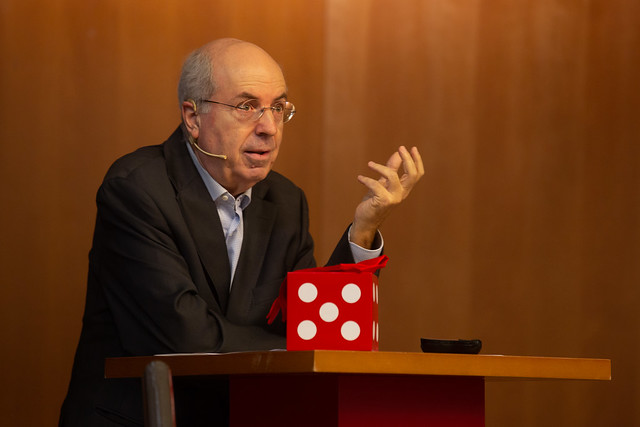The inauguration of the 2018-2019 academic year at UPF focuses on the concept of Planetary Wellbeing
The inauguration of the 2018-2019 academic year at UPF focuses on the concept of Planetary Wellbeing
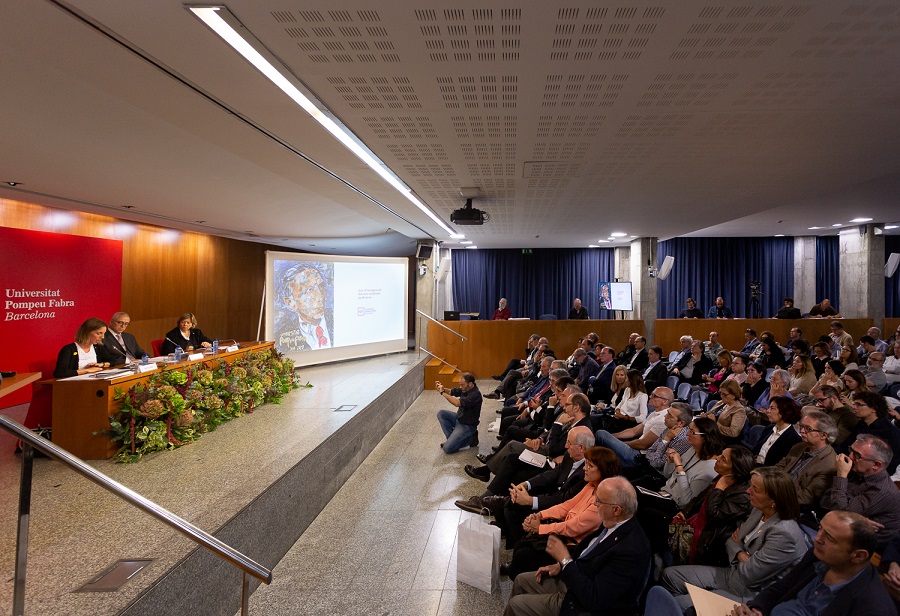
Planetary Wellbeing, a project recently launched by UPF to find solutions to the global problems of the planet affecting people’s quality of life, was the main theme of the opening ceremony of the 2018-2019 academic year.
The event, held on 9 November at noon in the auditorium of the Ciutadella campus, included the inaugural lesson “El cervell il·lusionista. A propòsit de les neurociències que hi ha darrere la màgia” (The illusionistic brain. About the neuroscience behind magic). It was given by Jordi Camí, full professor of Pharmacology with the Department of Experimental and Health Sciences at UPF, director general of the Barcelona Biomedical Research Park (PRBB) and director of the Pasqual Maragall Foundation.
> Video of de ceremony published on Youtube
The inauguration, presided by UPF rector Jaume Casals, was attended by Maria Àngels Chacón, minister of Enterprise and Knowledge of the Generalitat (Government) of Catalonia; Núria Basi, president of the UPF Board of Trustees, as well as other academic officers of the University and people related to the university and teaching from Catalonia.
The event began with a welcome by Jaume Casals, leading to the screening of the videoreport of the 2017-2018 academic year at UPF, a review of the main milestones achieved in the areas of teaching, research and transfer, institutional outreach and the university community. The main thread of the videoreport was the 150th anniversary of the birth of Pompeu Fabra, which UPF has been celebrating through various activities to disseminate his person and work.
> Videoreport of the 2017-2018 academic year
Then, Jaume Casals gave the floor to Jordi Camí to give his inaugural lecture entitled “El cervell il·lusionista. A propòsit de les neurociències que hi ha darrere la màgia” (The illusionistic brain. About the neuroscience behind magic).
Inaugural lecture by Jordi Camí
Professor Camí presented an analysis of the mechanisms (summarized in four points or four aspects that must be mastered by illusionists) that explain how magic works, from the perspective of the neurosciences. “Magic takes advantage of all the strategies of our brain”, he affirmed.
According to Jordi Camí, in order to achieve the illusion of impossibility, magic plays with our automatisms, with our cognitive predispositions. In short, magicians have learned to dialogue with the unconscious brain, this, our great unknown”.
> Inaugural lecture in full in PDF
Excerpts from the lecture
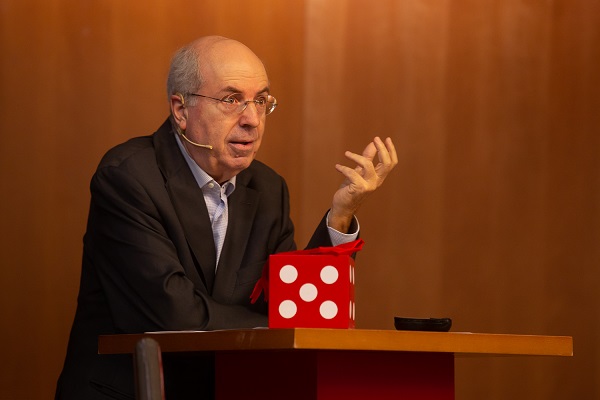
—Illusion of continuity: “Even though discontinuously we grasp what there is in the world, our experience is continuous, not fractioned [...] But it is an illusory continuity, since the brain fuses the different brushstrokes we make in a single scene, and fill the gaps thanks to the information retained ephemerally in our sensory memories” [...] This illusion of continuity has its collateral effects. One of them is called “blindness to change”.
—Processing outside information by the brain only when it detects differences: “Contrast and context are our references when processing what we receive through the senses [...] The receptors of our sensory organs and the neurons only react, become active, when there is contrast. If something in the scene moves or is anomalous it generates contrast, it calls our attention, makes us reflect”.
—The control of attention: “To focus on something in particular, we use a process of orientation and filtering we call attention, a process that is supported by the short-term memory [...] When we look at something for the first time we have to make an effort to pay attention aimed at interpreting what we observe, an effort that has nothing to do with the effort required when the scene is already familiar [...]
—Act of perceiving based on the interpretation of information: “To perceive is to interpret, which is possible thanks to what we have learned, thanks to the information we keep in our memories. To perceive is to infer, and it is a process that forces us to be creative. [...] The perceptual process has the particularity that it always offers us solutions, it never leaves us in the lurch; in addition, the solutions emerge immediately, automatically” [...]
Awarding of prizes by de Board of Trustees
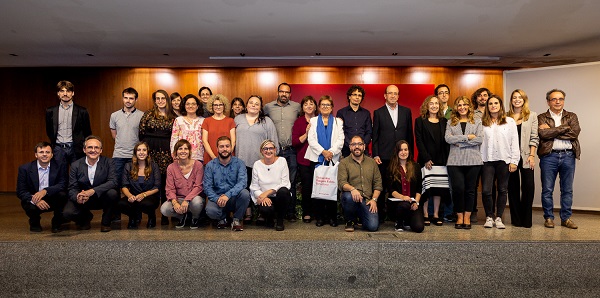
Following the inaugural lesson, the prizes were awarded by the UPF Board of Trustees. Pere Torra, general secretary of the University, revealed the names of the winning projects and people, who came up on stage to collect their awards from Núria Basi, president of the Board of Trustees.
The awards were presented for quality in teaching; knowledge transfer; initiative and innovation in administration and services, and finally, the winners of the fifth edition of the University Social Responsibility Projects Competition, promoted jointly with the vice-rector’s office responsible for the management of projects for social engagement and equality.
The ceremony continued with a block of speeches by the authorities, begun by Núria Basi, president of the UPF Board of Trustees.
Speech by Núria Basi
Excerpts from the speech
”I want optimism and pride to centre the out loud reflection allowed to me by the opening of this new academic year. And I’ll do so in spite of the consequences of the cut-backs of recent years and the country’s current complex context. I think that we all deserve this”.
“Cooperation has made great both the university and the country, due to the many things in which the cultivation of knowledge contributes to social development and progress”.
“UPF is always innovating and looking forward, creating new models of studies, excelling in research, improving its management and, above all, taking care of what makes it what it is”.
“For me, this, perhaps, my last year of mandate, I also want to express pride and commitment; two attitudes that I have tried to uphold throughout the years”.
Speech by Àngels Chacón
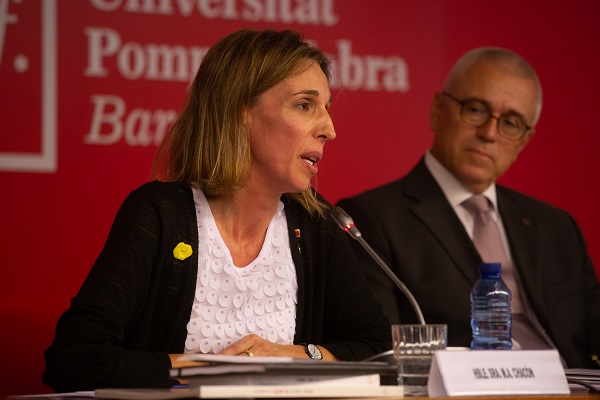
The minister of Enterprise and Knowledge began her speech with a thought for prisoners and exiles and for the historian Josep Fontana, founder of UPF’s Jaume Vicens i Vives Institute of History, who died recently.
The minister said that the University should be a combination of generating good positions in the international rankings and also of knowledge, “milestones that UPF has managed to achieve in the Catalan University context, thanks to the individual and collective effort of many people, based on quality and rigor”. In this context, she reviewed the University’s recent results in the main world rankings: “This recognition is at the same time a result that helps to build our country”, she emphasized.
She then mentioned the recent celebration of the 25th anniversary of the Catalan university system, which she described as “one of the most compact in the world and among the most competitive on a global scale”, and basic in terms of being a social ladder and for its economic impact.
She lamented that the current political context had prevented the pending reforms in the field of university and research, in areas such as the faculty (“there hasn’t been a suitable renewal for ten years, and there is an overreliance on certain figures of unstable recruitment”), governance and attracting talent. “We must progress with the bases and the coordination of the University system to improve and enable the knowledge society”, she stressed.
Maria Àngels Chacón said that within the Catalan Government’s governance plan a National Pact for the Knowledge Society is being developed, a process of discussion and analysis that seeks broad agreement and consensus among citizens, economic agents, the administration and society. This plan should include a balance of budgets, improvements in university departments, an effective research and personnel policy. “We have to think in the long term, create new mechanisms that enable resources for research and development to account for 2% of GDP, with private sector support, like in some of our neighbouring countries”.
Finally, the minister addressed the students urging them, in addition to acquiring excellent knowledge, technical and non-technical skills, not to forget who they are, the society to which they belong, and that the future of this society depends on them.
Speech by the rector, Jaume Casals
> Speech by Jaume Casals in PDF
Excerpts from the speech
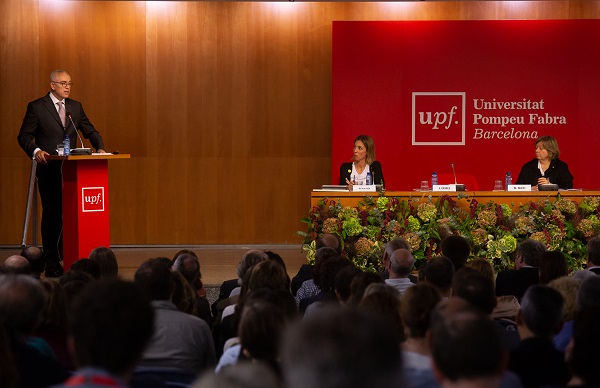
“Strictly speaking it is not all science at university. To claim that the moulds of science are exhaustively applied to all academic events is a mistake to which we have been accustomed by certain spectres I think are less common today than a few years ago, but still present. The university also has an extraordinary cultural task to perform and I believe that our university would do well to stand out in this field as it stands out in the scientific standards”.
“It is absolutely essential to be an exemplary university in this cultural and communicative dimension. In my opinion, there is no scientifically credible institution if it is not also supported in this congenital fundament by all universities with the self-respect to bear this name. [...] all the goodness that the academic activity of UPF may have is worthless if it cannot be measured it in terms of what impact it has in the world”.
“Planetary Wellbeing is the name of an attempt to seriously put UPF to the test around a profile with a relief that is as much scientific as social, a transversal profile that compels us to relativize the frontiers of our academic and administrative units in the interest of knowledge and of the streamlining of the organization [...] “This signal, well laid out, would make an indisputable gesture by UPF in the direction of what I have just coined “impact capacity”, that is to say, the all too unusual gesture in our environment in favour of progress and wellbeing that, as a university, we are required to make”.
Jaume Casals ended his speech by declaring the 2018-2019 academic year open and the UPF Choir performed the traditional university song Gaudeamus Igitur.
Biography of Jordi Camí
Jordi Camí Morell is a PhD in Medicine and full professor of Neuropharmacology with the Department of Experimental and Health Sciences (DCEXS) at UPF. For over 25 years, his scientific career focused on the field of neuroscience and, in particular, the case of drugs of abuse. He later steered his career towards the fields of bibliometry, scientific evaluation and policy. Altogether, these activities have resulted in more than 150 publications and several monographs, as well as the supervision of 15 PhD theses.
Since 2005, Camí has directed the Barcelona Biomedical Research Park (PRBB), an initiative of UPF along with the Generalitat (Government) of Catalonia and Barcelona City Council. The PRBB is made up of six research centres of excellence and has become one of the major poles of biomedical research in southern Europe. Since 2008, professor Camí has directed the Pasqual Maragall Foundation, affiliated to UPF, where he promotes scientific projects to prevent Alzheimer’s disease and better understand cognition, memory and related neurodegenerative diseases.
Since November 2017 he has been an affiliated numerary member of the Biological Sciences section of the Institute of Catalan Studies.
The inaugural poster for the 2018-2019 academic year is the work of Antoni Vives Fierro
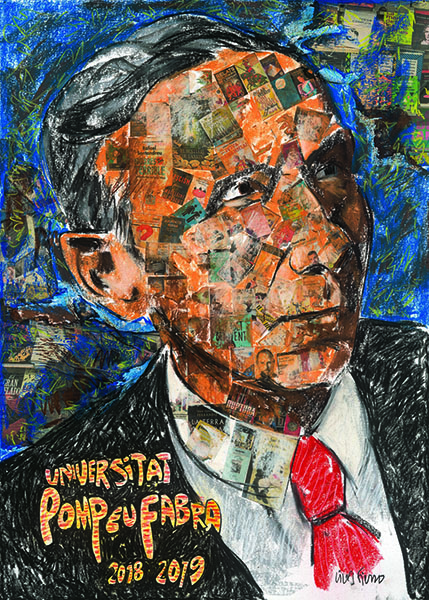 The inaugural poster for the new academic year is a collage and wax on paper, which renders a portrait of Pompeu Fabra, coinciding with the year commemorating the 150th anniversary of his birth.
The inaugural poster for the new academic year is a collage and wax on paper, which renders a portrait of Pompeu Fabra, coinciding with the year commemorating the 150th anniversary of his birth.
Antoni Vives Fierro (Barcelona, 1940) is a Catalan painter, specializing in urban landscapes. He studied at the Llotja de Barcelona and trained at the Cercle Artístic de Sant Lluc, where he was a pupil of Josep Maria Garrut i Romà and of the sculptor Tomàs Bel i Sabatés.
In 1961 he moved to Paris and the following year he exhibited for the first time in Cartagena. As of 1970, he mainly lived in London, a city that is the subject of many of his paintings and where he held exhibitions in the early 1970s. From 1980 he focused his work again in Barcelona, and from the mid-90s, in Havana.
He is a versatile artist using different techniques in his paintings, but in recent years has opted for oil with collage. He has a figurative style with a post-impressionism of urban or suburbial themes which have made him better known, although some of his work is landscapes. He also done significant graphic work, especially the production of commercial and commemorative posters.
His art has been acknowledged with several awards, including the gold medal and the Girona award for painting (1979), the Ricard Canals painting prize (1980) and Clau de Barcelona (1998). In 1997 he received the Government of Catalonia prize for the design of the Joia de la sardana. In 2002 he was awarded the Saint George’s Cross and in 2003 he won the Joan Fuster essay prize for El nacionalisme que ve.

